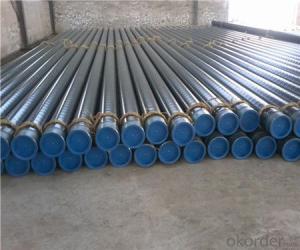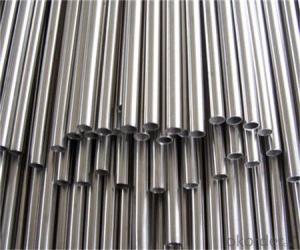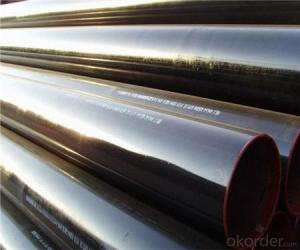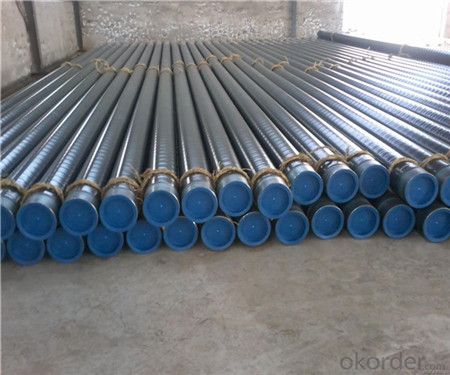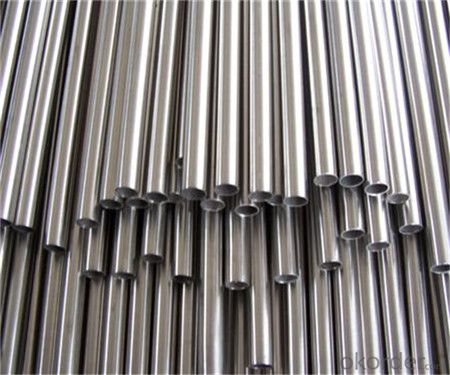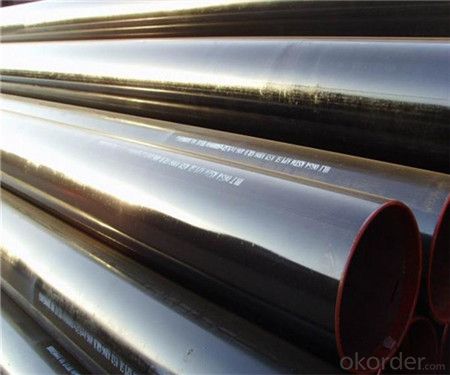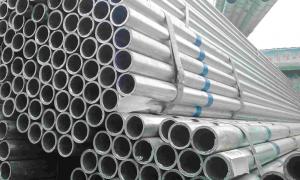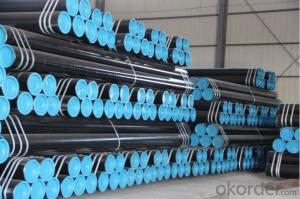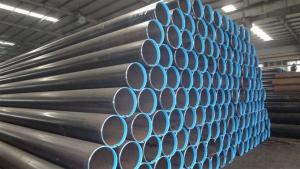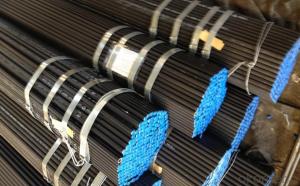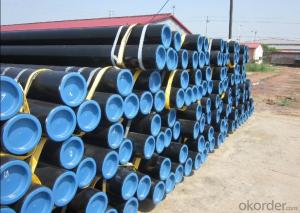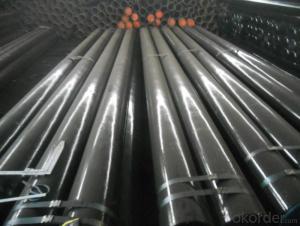Seamless Steel Pipe High Quality/Best Price with API 5L
- Loading Port:
- Tianjin
- Payment Terms:
- TT OR LC
- Min Order Qty:
- 25 m.t.
- Supply Capability:
- 20000 m.t./month
OKorder Service Pledge
OKorder Financial Service
You Might Also Like
1、Structure of Seamless Steel Pipe High Quality/Best Price with API 5L:
Seamless pipe is formed by drawing a solid billet over a piercing rod to create the hollow shell. As the manufacturing process does not include any welding, seamless pipes are perceived to be stronger and more reliable. Historically seamless pipe was regarded as withstanding pressure better than other types, and was often more easily available than welded pipe.
2、Seamless Steel Pipe High Quality/Best Price with API 5L Specification:
Standard | GB, DIN, ASTM ASTM A106-2006, ASTM A53-2007 |
Grade | 10#-45#, 16Mn 10#, 20#, 45#, 16Mn |
Thickness | 8 - 33 mm |
Section Shape | Round |
Outer Diameter | 133 - 219 mm |
Place of Origin | Shandong, China (Mainland) |
Secondary Or Not | Non-secondary |
Application | Hydraulic Pipe |
Technique | Cold Drawn |
Certification | API |
Surface Treatment | factory state or painted black |
Special Pipe | API Pipe |
Alloy Or Not | Non-alloy |
Length | 5-12M |
Outer Diameter | 21.3-610mm |
Grade | 20#, 45#, Q345, API J55, API K55, API L80, API N80, API P110, A53B |
Standard | ASME, ASTM |
1) Material:20#(ASTM A 106/A53 GRB.API5LGRB,GB),45#,16Mn,10#.
2) Specification range:OD:21.3-610mm,WT:6-70mm,length:6-12m or according to the requirement of clients.
3) Excutive standards:GB,ASME API5L.ASTM A 106/A53,Despite of the above standards,we can also supply seamless steel pipe with standard of DIN,JIS,and so on,and also develop new products according to the requirements of our clients!
4) Surface:black lacquered,varnish coating or galvanized.
5) Ends:Beveled or square cut,plastic capped,painted.
6) Packing:bundles wrapped with strong steel strip,seaworthy packing.
3、Main Features of Seamless Steel Pipe High Quality/Best Price with API 5L:
• High manufacturing accuracy
• High strength
• Small inertia resistance
• Strong heat dissipation ability
• Good visual effect
• Reasonable price
4、Packaging & Delivery
Packaging Details: | seaworthy package,bundles wrapped with strong steel strip |
Delivery Detail: | 15-30days after received 30%TT |
5、FAQ of Seamless Steel Pipe High Quality/Best Price with API 5L:
①How is the quality of your products?
Our products are manufactured strictly according to national and internaional standard, and we take a test
on every pipe before delivered out. If you want see our quality certifications and all kinds of testing report, please just ask us for it.
Guaranteed: If products’ quality don’t accord to discription as we give or the promise before you place order, we promise 100% refund.
②How about price?
Yes, we are factory and be able to give you lowest price below market one, and we have a policy that “ for saving time and absolutely honest business attitude, we quote as lowest as possible for any customer, and discount can be given according to quantity”,if you like bargain and factory price is not low enough as you think, just don’t waste your time.Please trust the quotation we would give you, it is professional one.
③Why should you chose us?
Chose happens because of quality, then price, We can give you both.Additionally, we can also offer professional products inquiry, products knowledge train(for agents), smooth goods delivery, exellent customer solution proposals.Our service formula: good quality+good price+good service=customer’s trust
SGS test is available, customer inspection before shipping is welcome, third party inspection is no problem.
6、Seamless Steel Pipe High Quality/Best Price with API 5L Images:
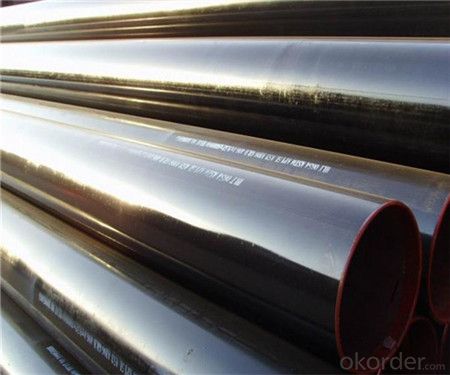
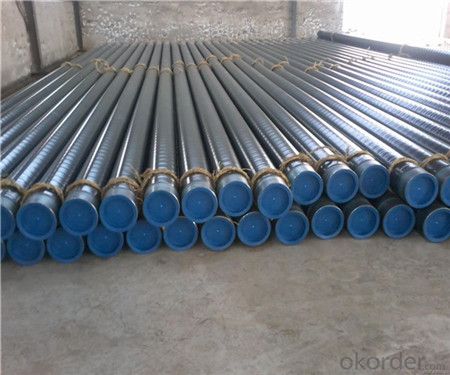
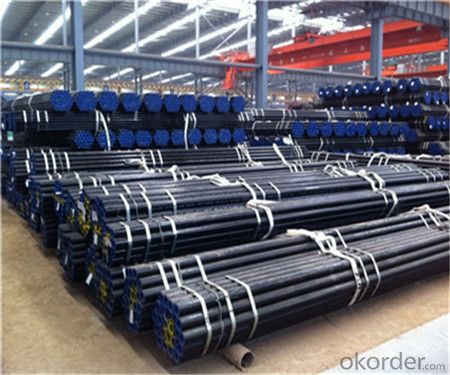
- Q: Who knows what is the difference between double submerged arc welded pipe and longitudinal submerged arc welding?
- Double submerged arc welding should be for spot welding and single side welding, they are straight line welds, but double submerged arc welding seam is more beautiful and fine.
- Q: Can steel pipes be bent or curved?
- Yes, steel pipes can be bent or curved using specialized machinery and techniques such as cold bending, induction bending, or hot bending.
- Q: What are the specific differences between flexible pipes and rigid pipes?
- From the model:Rigid waterproof sleeve: A, B and C, A type, suitable for steel pipe, B, suitable for cast iron pipe and ductile iron pipe;Flexible waterproof bushings: A and B, A used in the internal walls of buildings, B used in the exterior walls of buildings.In use:
- Q: What are the different methods of pressure testing steel pipes?
- There are several methods of pressure testing steel pipes, including hydrostatic testing, pneumatic testing, and ultrasonic testing. Hydrostatic testing involves filling the pipe with water and applying pressure to check for leaks or weaknesses. Pneumatic testing uses compressed air or gas to pressurize the pipe and detect any leaks or failures. Ultrasonic testing utilizes high-frequency sound waves to inspect the pipe's integrity by detecting any flaws or defects.
- Q: Can steel pipes be used for structural applications?
- Yes, steel pipes can be used for structural applications.
- Q: What does "SC50" steel pipe mean in civil engineering?
- SC50: laying on welded steel tubes of diameter 50mm. SC is usually used in electrical installation drawings.
- Q: How are steel pipes used in firefighting systems?
- Steel pipes are used in firefighting systems to transport water or other fire-suppressing agents from a water source to the location of a fire. These pipes are durable and resistant to heat, making them suitable for carrying large volumes of water at high pressure to extinguish fires effectively. Additionally, steel pipes are often used for underground or overhead fire hydrant systems, sprinkler installations, and standpipe systems in buildings to ensure a reliable and efficient firefighting infrastructure.
- Q: What is the difference between steel pipes and FRP pipes?
- Steel pipes and FRP (Fiber Reinforced Plastic) pipes are two different types of pipes that are commonly used in various industries and applications. Here are the key differences between the two: 1. Material Composition: Steel pipes are made of steel, which is an alloy of iron and carbon, with additional elements like manganese, silicon, and traces of other metals. On the other hand, FRP pipes are composed of a polymer matrix reinforced with fibers, such as glass or carbon fibers. 2. Strength and Durability: Steel pipes are known for their high strength and durability. They can withstand high pressures, heavy loads, and extreme temperatures. FRP pipes, although strong and durable, are comparatively lighter in weight and may not have the same level of strength as steel pipes. However, they are corrosion-resistant and have a longer lifespan in corrosive environments. 3. Corrosion Resistance: Steel pipes are prone to corrosion and require protective coatings or linings to prevent rust and deterioration. FRP pipes, on the other hand, are inherently corrosion-resistant. They do not require additional coatings and are suitable for transporting corrosive fluids or operating in corrosive environments. 4. Installation and Maintenance: Steel pipes require specialized welding or threading techniques for installation. They can be more labor-intensive and time-consuming to install, especially in complex or large-scale projects. FRP pipes, on the other hand, are lightweight and can be easily transported and installed. They often come in pre-fabricated sections, making installation faster and less labor-intensive. Additionally, FRP pipes require minimal maintenance compared to steel pipes. 5. Cost: Steel pipes are generally more expensive than FRP pipes due to the higher cost of raw materials and the need for additional corrosion protection measures. FRP pipes offer a cost-effective alternative, especially in applications where corrosion resistance is essential, as they eliminate the need for expensive coatings or linings. Overall, the choice between steel pipes and FRP pipes depends on the specific requirements of the application. Steel pipes are preferred for their high strength, while FRP pipes offer benefits such as corrosion resistance, lightweight, and cost-effectiveness.
- Q: What is the difference between steel pipes and concrete-lined pipes?
- The main difference between steel pipes and concrete-lined pipes lies in their composition and protective features. Steel pipes are typically made entirely of steel, providing strength and durability. On the other hand, concrete-lined pipes consist of a steel pipe coated with a layer of concrete. This lining offers additional protection against corrosion and abrasion. While steel pipes are more suitable for high-pressure applications and offer better resistance to external factors, concrete-lined pipes are commonly used in wastewater systems to prevent corrosion and extend the lifespan of the pipe.
- Q: How are steel pipes used in the chemical processing industry?
- Steel pipes are used extensively in the chemical processing industry as they offer superior strength, durability, and resistance to corrosion. These pipes are used to transport various chemicals, including acids, alkalis, and solvents, throughout the processing plants. They are also utilized for conveying gases, steam, and liquids under high pressure and temperature conditions. Furthermore, steel pipes are employed in the construction of chemical reactors, heat exchangers, and storage tanks, ensuring the safe and efficient operation of chemical processes.
Send your message to us
Seamless Steel Pipe High Quality/Best Price with API 5L
- Loading Port:
- Tianjin
- Payment Terms:
- TT OR LC
- Min Order Qty:
- 25 m.t.
- Supply Capability:
- 20000 m.t./month
OKorder Service Pledge
OKorder Financial Service
Similar products
Hot products
Hot Searches
Related keywords
